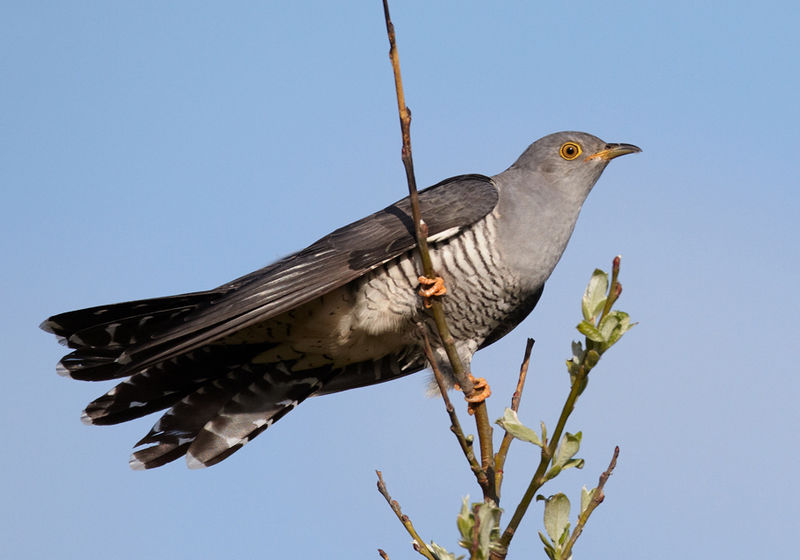Having grown up in North America, my only experience with the common cuckoo was via cuckoo clocks, but here in Hungary the common cuckoo is . . . well, quite common. Since moving to Hungary five years ago, I have used the cuckoo to keep track of the transition from spring to summer. I usually hear the first cuckoo in early April. In May, practically all you hear in my area is cuckoo calls. Then in June, the easily recognizable double note cu-coo song changes. By the end of June, I stop hearing the cuckoo altogether. Appropriately enough, my experience of hearing cuckoo birds matches the old nursery rhyme to a 't'.
Cuckoo, cuckoo, what do you do?
In April I open my bill;
In May I sing all day;
In June I change my tune;
In July away I fly
In August away I must.
True to form, the cuckoos around my house have been singing all day, but this year it appears there are many more of them. The air is saturated with unrelenting, incessant cu-coos from sun up all the way to sun down. I've never experienced anything like it. It's as if a massive cuckoo clock factory suddenly set up shop near my house.
Of course, I am not annoyed or irritated by this at all; I just find it odd. I estimate the amount of cuckoo song to be at least three or four times greater than in previous years, which means one of two things: the cuckoos are getting noisier; or there a lot more of them around.
I lean toward the second conjecture myself. The area surrounding my village - a rural mix of fields, pastures, woodlands, and rivers - provides the perfect habitat for cuckoos, especially the rivers where many great reed warblers nest along the riverbanks. Its recognizable song aside, the cuckoo is also famed for being a master brood parasite, and it has a penchant for laying its eggs in reed warbler nests and then letting the reed warbler raise the cuckoo hatchling, provided the warbler doesn't get wise to the scam and jettison the cuckoo egg before it hatches.
Oddly enough, there seems to be many more reed warblers this year as well, which doesn't add up in my mind. Whatever the case, I'll take the apparent overall increase in the bird population in my area as a good thing and leave it at that.
One last point, though I have heard cuckoos constantly every spring over the past five years, I have only rarely managed to catch a glimpse of one. Whenever I do, it tends to be rather far away. The closest I have ever come to a cuckoo is about fifty meters. The second I get a step closer, it takes off and alights on another, distant tree.
Parasitical; master mimicker; practically invisible; a joyful, yet almost mocking double note call; it's hardly surprising Shakespeare, among others used the cuckoo as a sign of bad luck and infidelity. As far as I'm concerned, the cuckoo symbolizes only the positive, which is why I prefer William Wordsworth's take on this most peculiar bird:
To the Cuckoo
O blithe New-comer! I have heard,
I hear thee and rejoice.
O Cuckoo! shall I call thee Bird,
Or but a wandering Voice?
While I am lying on the grass
Thy twofold shout I hear;
From hill to hill it seems to pass,
At once far off, and near.
Though babbling only to the Vale
Of sunshine and of flowers,
Thou bringest unto me a tale
Of visionary hours.
Thrice welcome, darling of the Spring!
Even yet thou art to me
No bird, but an invisible thing,
A voice, a mystery;
The same whom in my school-boy days
I listened to; that Cry
Which made me look a thousand ways
In bush, and tree, and sky.
To seek thee did I often rove
Through woods and on the green;
And thou wert still a hope, a love;
Still longed for, never seen.
And I can listen to thee yet;
Can lie upon the plain
And listen, till I do beget
That golden time again.
O blessèd Bird! the earth we pace
Again appears to be
An unsubstantial, faery place;
That is fit home for Thee!


 RSS Feed
RSS Feed

